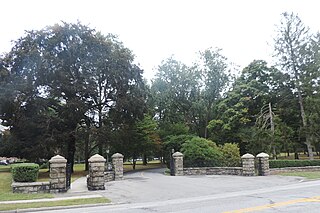Related Research Articles
Optica, founded as the Optical Society of America, is a professional society of individuals and companies with an interest in optics and photonics. It publishes journals, organizes conferences and exhibitions, and carries out charitable activities.
Cryobiology is the branch of biology that studies the effects of low temperatures on living things within Earth's cryosphere or in science. The word cryobiology is derived from the Greek words κρῧος [kryos], "cold", βίος [bios], "life", and λόγος [logos], "word". In practice, cryobiology is the study of biological material or systems at temperatures below normal. Materials or systems studied may include proteins, cells, tissues, organs, or whole organisms. Temperatures may range from moderately hypothermic conditions to cryogenic temperatures.

The Geological Society of America (GSA) is a nonprofit organization dedicated to the advancement of the geosciences.

St. Joseph's Seminary and College, sometimes referred to as Dunwoodie after the Dunwoodie neighborhood of Yonkers, New York in which it is located, is the major seminary of the Archdiocese of New York. Since 2012, it has also been the major seminary for the Diocese of Brooklyn and the Diocese of Rockville Centre.

Victor Ambrus was a Hungarian-born British illustrator of history, folk tales, and animal story books. He also became known from his appearances on the Channel 4 television archaeology series Time Team, on which he visualised how sites under excavation may have once looked. Ambrus was an Associate of the Royal College of Art and a Fellow of both the Royal Society of Arts and the Royal Society of Painters, Etchers and Engravers. He was also a patron of the Association of Archaeological Illustrators and Surveyors up until its merger with the Institute for Archaeologists in 2011.

The Bernard Tucker Medal is awarded by the British Trust for Ornithology for services to ornithology. It is named in memory of Bernard Tucker, their first Secretary. It has been awarded since 1954, usually annually although there are some years when no medals were awarded.

International Brotherhood of Magicians (I.B.M.) is an organization for both professional and amateur close-up and stage magicians, with approximately 15,000 members worldwide. The headquarters is in St. Charles, Missouri. There are over 300 local groups, called Rings, in more than 88 countries, largely concentrated in cities of the United States and Canada. The organization publishes a monthly periodical entitled The Linking Ring, which features tricks, coverage of shows and events in the magic community, and interviews with magicians.
The Chauvenet Prize is an annual award given by the Mathematical Association of America in recognition of an outstanding expository article on a mathematical topic. It consists of a prize of $1,000 and a certificate.
The Meldola Medal and Prize was awarded annually from 1921 to 1979 by the Chemical Society and from 1980 to 2008 by the Royal Society of Chemistry to a British chemist who was under 32 years of age for promising original investigations in chemistry. It commemorated Raphael Meldola, President of the Maccabaeans and the Institute of Chemistry. The prize was the sum of £500 and a bronze medal.

The International Order of Characters (IOC) is an organization dedicated to improving the fields of aviation and aerospace. The IOC also provides financial assistance to persons and organizations in fields related to aviation and other technology industries.
The Southern Africa Association for the Advancement of Science (S2A3 or S2A3) is a learned society, originally known as the South African Association for the Advancement of Science (SAAAS). Established in 1902, its principal aim is to increase the public awareness and understanding of science, engineering and technology, and their role in society, by means of various awards and by communicating the nature, processes, ethics, and excitement of science. Membership is open to all.
The American Association of Immunologists (AAI) is an international scientific society dedicated to furthering the study of immunology. AAI provides its members with a variety of platforms in which to exchange ideas and present the latest immunological research, including the AAI annual meeting and The Journal of Immunology. In 2017, AAI launched an open-access journal, ImmunoHorizons. AAI is a founding member society of the Federation of American Societies for Experimental Biology (FASEB).
The Vermont Bar Association (VBA) is a voluntary bar association for the state of Vermont.
The American Theological Society (ATS), founded in 1912, is the oldest professional theological society in North America. It has met at least once each year in various locations on the East Coast of the United States, lately at Princeton Theological Seminary in Princeton, New Jersey. Membership is by nomination and election, and is limited to 100 people at any given time. The purpose of the American Theological Society is to foster research excellence in the various theological disciplines and to cultivate collegial relationships.
The British Mass Spectrometry Society is a registered charity founded in 1964 that encourages participation in every aspect of mass spectrometry. It aims to encourage participation in all aspects of mass spectrometry on the widest basis, to promote knowledge and advancement in the field and to provide a forum for the exchange of views and information. The first foundations of the BMSS were laid in 1949 with the establishment of the Mass Spectrometry Panel by the Hydrocarbon Research Group.
The Society of Christian Ethics (SCE) is a non-denominational academic society that promote scholarly work in Christian ethics and the relation of Christian ethics to other ethics traditions. Its members are faculty and students at universities, colleges, and theological schools primarily in the United States, Canada, and Europe.
The Australian Men's Interstate Teams Matches were an amateur team golf competition for men between the states and territories of Australia.
References
- ↑ "About". www.societyforcryobiology.org. Retrieved 2024-02-23.
- ↑ "CRYO2024". www.societyforcryobiology.org. Retrieved 2024-02-23.
- ↑ "Past Presidents of the Society for Cryobiology". www.societyforcryobiology.org. Retrieved 2024-06-24.
- ↑ "Peter Mazur (1928–2015) | Embryo Project Encyclopedia". embryo.asu.edu. Retrieved 2024-06-24.